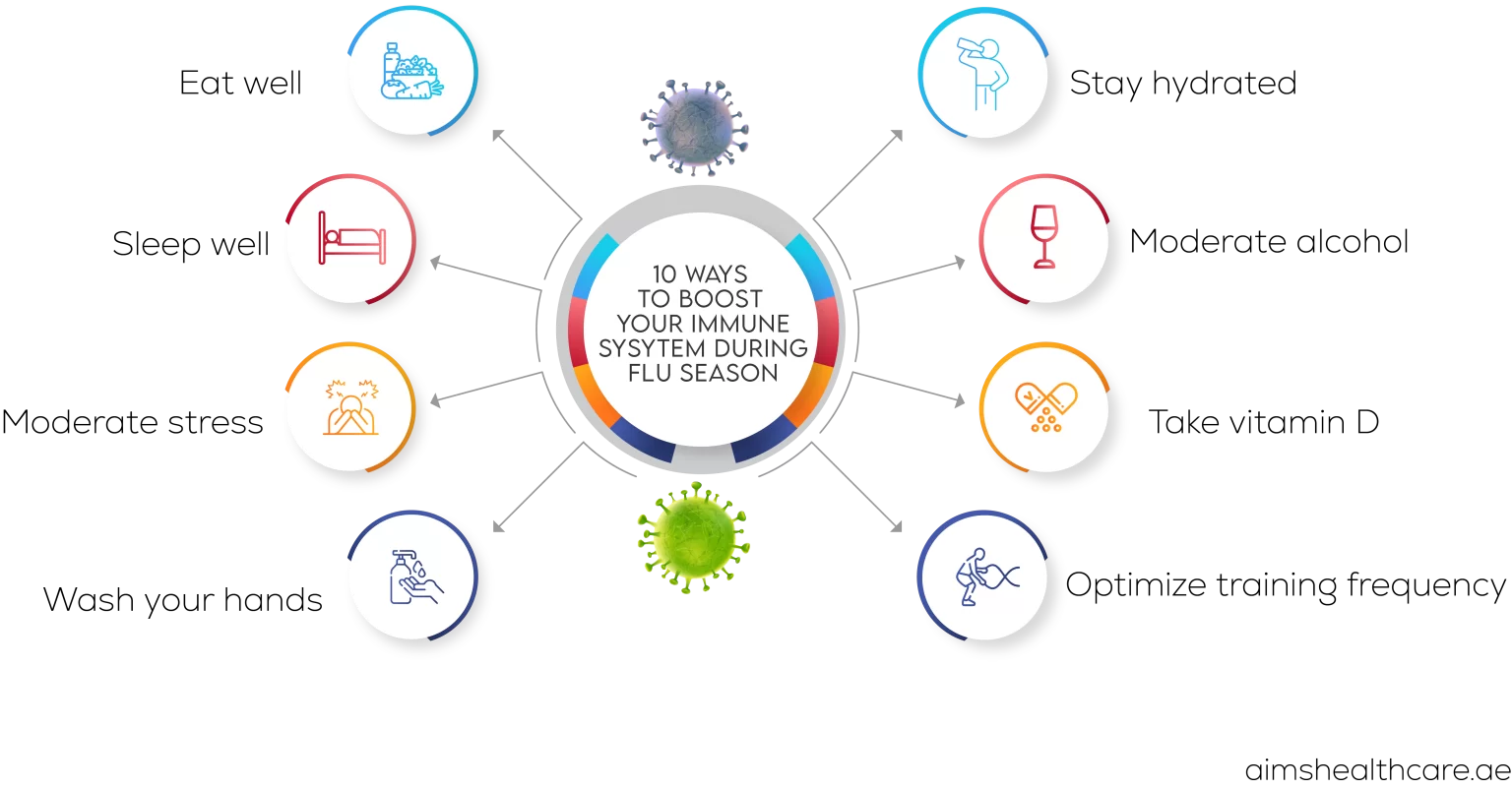
Benefits of NIPT Test for Expecting Mothers
Table of Contents Healthy Fasting, Happy Digestion! Explore Tips for a Smooth Ramadan. As the holy month approaches, fasting holds significant spiritual and cultural importance

The cold and flu season is upon us, and keeping our immune system strong and healthy is more important than ever. The immune system is our body’s natural defense against viruses and bacteria that cause infections and diseases. A robust immune system can help us fight the common cold and flu.
But did you know you have a powerful ally in your fight against the germs? It’s the sun!
Sunshine is a source of warmth and light and a natural provider of vitamin D, essential for a strong immune system.
But how can you get enough vitamin D from the sun? And what are some other ways to boost your immune system naturally? This blog will share 10 strategies to enhance your immune system during the cold and flu season.

Enjoying the sun and fresh air is one of the best ways to improve your immune system during the cold and flu season. When you spend time outdoors, you expose your skin to the sun’s rays, which help your body produce vitamin D.
Vitamin D is a hormone that regulates your immune system and bone health and prevents excessive inflammation, which can damage your tissues and organs. Studies have shown that vitamin D deficiency is linked to an increased risk of respiratory infections, such as colds and flu.
To get enough vitamin D from the sun, you should aim for about 15 to 20 minutes of direct sunlight exposure per day, preferably in the morning or evening, when the sun is not too strong. You should also avoid sunburn and use sunscreen and sunglasses to protect your skin and eyes from harmful UV rays.
Fresh air can also benefit your immune system, as it helps clear your lungs and improve your respiratory health. Breathing in fresh air can reduce stress, lower blood pressure, and boost your mood. Fresh air can also increase your blood’s oxygen levels, improving your circulation and energy. Try to get at least 30 minutes of fresh air every day, by walking, biking, gardening, or playing outside.
One of the most effective ways to prevent the flu and its complications is to get a flu vaccination yearly. The flu vaccine protects kids and adults, even you from the most common strains of the influenza virus circulating in the region. It also reduces the severity of the symptoms if you do get sick.
Vaccination also helps protect others around you, especially those more vulnerable to the flu, such as the elderly, children, pregnant women, and people with chronic conditions. It is called herd immunity and is crucial to prevent outbreaks and pandemics.
The Dubai government provides free flu vaccinations to all citizens and residents nationwide at various health centers and hospitals. You can also get a flu shot at home by booking a doctor on call service. The best time to get vaccinated is before the flu season starts, usually from October to March.
Another simple but powerful way to prevent the spread of viruses and bacteria is to wash your hands properly and frequently. Handwashing removes dirt, germs, and chemicals from your hands and prevents them from entering your body or transferring to others.
Proper handwashing involves wetting your hands with clean water, applying soap, and rubbing your hands together for at least 20 seconds. Make sure to cover all parts of your hands, including the palms, backs, fingers, thumbs, nails, and wrists. Then rinse your hands with water and dry them with a clean towel or air dryer.
You should wash your hands before and after eating, prepare food, use the toilet, touch your face, cough or sneeze, handle garbage, or touch animals. You should also wash your hands after coming home from outside, especially if you have been in crowded or public places.
If soap and water are unavailable, use an alcohol-based hand sanitizer containing at least 60% alcohol. However, hand sanitizer is not a substitute for handwashing and does not remove all germs.
Dry and dusty air can irritate your nose, throat, and lungs, and make it easier for viruses and bacteria to survive and spread in the air. Therefore, one of the ways to enhance your immune system during the cold and flu season is to breathe better with humidified air.
Using a humidifier or vaporizer in your home or office, you can humidify the air. These devices emit water vapor or steam into the air, increasing humidity. You can add some essential oils, such as eucalyptus, lavender, or peppermint, to the water for extra benefits. These oils have antibacterial, antiviral, and anti-inflammatory properties and can soothe your cough and congestion.
However, be careful not to over-humidify the air, as too much moisture can cause problems, such as mold, mildew, and dust mites. The ideal humidity level for indoor spaces is between 40% and 60%. You can use a hygrometer to measure the humidity level and adjust the humidifier accordingly.
You should also clean and maintain your humidifier regularly to prevent the growth of bacteria and fungi in the water tank. Follow the manufacturer’s instructions and use distilled or filtered water to fill the humidifier.

Drinking enough water is vital for your immune system, as it helps flush out toxins and waste products from your body. It also helps keep your mucous membranes moist, the thin layers of tissue that line your nose, mouth, and lungs. These membranes act as a barrier against viruses and bacteria, trapping and expelling them before they enter your body.
The water you need depends on age, weight, activity level, and climate, but adults generally need about two to three liters daily. To ensure an adequate water intake, you should drink water throughout the day, especially before and after exercise, when you feel thirsty, or when you have a fever, diarrhea, or vomiting.
You can also drink other fluids, such as herbal teas, soups, juices, or smoothies to stay hydrated. However, avoid drinks that contain sugar, caffeine, or alcohol, as they can dehydrate you and impair your immune function.
Sleep is essential for your immune system, as it helps your body repair and regenerate itself. During sleep, your body produces and releases cytokines, which are proteins that fight inflammation and infection. Lack of sleep can reduce the production of cytokines and weaken your immune response.
The amount of sleep you need depends on your age, lifestyle, and health condition, but generally, adults need about seven to nine hours of sleep per night. To improve your sleep quality, follow a regular sleep schedule, avoid caffeine, alcohol, and nicotine before bed, limit screen time and exposure to blue light at night, and create a comfortable and dark sleeping environment.
You can also use natural remedies to help you fall asleep, such as chamomile tea, lavender oil, or melatonin supplements. However, consult your doctor before taking any supplements, especially if you have any medical conditions or are taking any medications.
Exercise is another important factor for your immune system, as it helps improve your blood circulation and lymphatic system. These systems transport oxygen, nutrients, and immune cells throughout your body and remove waste products and toxins. Exercise also helps reduce stress, inflammation, and oxidative stress, all harmful to your immunity.
However, not all types of exercise are beneficial for your immune system.
These exercises help build and maintain muscle mass, supporting immune function.
You should avoid high-intensity exercise, such as sprinting, marathon running, or heavy lifting, as these can suppress your immune system and increase your risk of infection. You should also avoid exercising when you are sick.
Stress is another factor that can weaken your immune system, as it triggers the release of hormones, such as cortisol and adrenaline, that suppress your immune response and increase inflammation. Chronic stress can also affect your mood, sleep, appetite, and behavior, impairing immunity.
Therefore, managing stress is vital for your immune system and overall well-being. You can use various strategies to cope with stress, such as:

Eating a balanced and nutritious diet is crucial for your immune system, as it provides the vitamins, minerals, antioxidants, and other nutrients your body needs to fight infections and diseases. A healthy diet also helps maintain a healthy weight, which reduces the risk of chronic conditions, such as diabetes, heart disease, and cancer, that can compromise your immunity.
Some of the immune-boosting foods you can include in your diet are fruits and vegetables, especially those rich in vitamin C, such as citrus fruits, berries, kiwis, tomatoes, and peppers. Vitamin C is a powerful antioxidant that helps protect your cells from damage and supports the production of white blood cells, which are the cells that fight infections.
Other immune-boosting foods are nuts and seeds, especially those rich in zinc, such as almonds, cashews, pumpkin seeds, and sunflower seeds. Zinc is a mineral that helps regulate the immune system and heal wounds. You can also eat lean meats, eggs, dairy products, and seafood, which are good sources of protein and iron. Protein is the building block of antibodies, which are the molecules that recognize and neutralize foreign invaders. Iron is a mineral that helps transport oxygen to your cells and tissues.
Stimulants stimulate your nervous system and increase your alertness, energy, and mood. However, stimulants can also negatively affect your immune system, disrupting your sleep, increasing your blood pressure and heart rate, and dehydrating your body.
Some of the common stimulants that you should avoid or limit are:
If you are addicted to or dependent on these stimulants, you should seek help to quit or reduce your consumption. Dubai offers various support services and programs for those who want to quit smoking or other addictive substances.
These strategies are not only beneficial for your immunity but also for your overall health and well-being.
Besides these strategies, you should also get your tests done often to monitor your health status and detect any signs of infection. You can easily book a lab test at home and get your results online without any hassle.
Getting your tests done often is convenient and essential for your immune system. You can choose from various tests, such as blood count, vitamin levels, or antibody tests, and get them done at home by a professional lab technician. You can also opt for an IV drip at home to replenish your fluids and nutrients.
By incorporating these practices into your daily routine, you can protect yourself and your loved ones from infections and diseases and enjoy a happier and healthier life in Dubai.
Citrus fruits like oranges, lemons, and grapefruits may be good for fever and cold. They contain high levels of flavonoids and vitamin C, which can decrease inflammation and boost immunity1. Frozen, slushy fruit juices can also help to soothe a sore throat.
Some remedies that may help you feel better when you have a cold are drinking plenty of fluids, resting, gargling with salt water, using nasal saline drops or sprays, and taking over-the-counter pain relievers or cough medicines5. You can also eat foods rich in protein, zinc, and antioxidants, such as chicken soup, honey, and berries.
An immune booster can improve or enhance your body’s natural defenses against disease-causing organisms. It can be a food, a supplement, a vaccine, or a lifestyle change that can stimulate or support your immune system.
Some fruits that may be go od for the flu are watermelon, cantaloupe, kiwi, and strawberry. These fruits are high in water content and can help prevent dehydration. They also contain vitamin C and antioxidants that can reduce inflammation and fight infection.
One way to boost your immune system in 24 hours is to drink plenty of water and herbal teas, such as ginger or echinacea. You can also eat foods high in vitamin C, such as citrus fruits, bell peppers, and broccoli. Additionally, you can get at least 7 hours of sleep, avoid stress, and exercise moderately.

Table of Contents Healthy Fasting, Happy Digestion! Explore Tips for a Smooth Ramadan. As the holy month approaches, fasting holds significant spiritual and cultural importance

Table of Contents Healthy Fasting, Happy Digestion! Explore Tips for a Smooth Ramadan. As the holy month approaches, fasting holds significant spiritual and cultural importance

Table of Contents Healthy Fasting, Happy Digestion! Explore Tips for a Smooth Ramadan. As the holy month approaches, fasting holds significant spiritual and cultural importance